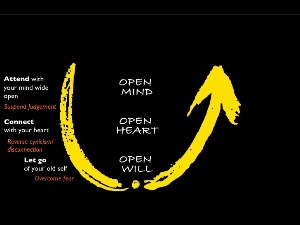What is Positive Change?
Positive Change is a methodology for implementing change initiatives and strengthening performance that is based on the principles of Appreciative Inquiry. It also utilises other strength-based practices such as positive psychology, neuroscience, the strengths research, Theory U, Simulators & Gamification and Open Space.
Whole System Dialogue
Energy, Ideas & Creativity
Desired Future & Flourishing
Appreciative Inquiry
Appreciative Inquiry is the study of what gives life to human systems when they are at their best. It is an organisation development methodology based on the assumption that inquiry into and dialogue about strengths, successes, values, hopes and dreams is itself transformational.
Appreciative Inquiry is a based on a model and set of guiding principles. This makes it incredibly adaptable. It has proved resilient approach despite the type of challenge, type of organisation or community, or geographic location.
Appreciative Inquiry works because it treats people like people, and not like machines. People are social. We create our identities and our knowledge in relation to one another. We are curious.
We like to tell stories and listen to stories. We pass on our values, beliefs and wisdom in stories. We like to learn and to use what we learn to be our best. And we delight in doing well in the eyes of those we care about and respect.
Appreciative Inquiry enables leaders to create natural human organisations – knowledge rich, strength based, adaptable, learning organisations


Positive Psychology in Organisations
Positive Organisational Psychology is the application of the principles and practices of positive psychology to create positive work life and high performance. Based on scientific research into the psychological drivers of well-being and success, it is providing managers and leaders with insights and practical tools to achieve extraordinary results for employees, teams and organisations.
Key subject areas include:-
- Engagement – the leveraging performance and character strengths, achieving ‘flow’ at work
- Positivity – positive emotions and positive, growth orientated mindsets
- Relationship – emotional intelligence, supportive networks of co-workers and collaborators
- Achievement – creativity & innovation, greater energy & perseverance in working towards shared goals, pride in accomplishment and celebrating success
- Meaning & Purpose – the role of higher purpose as a motivator of both loyalty, advocacy and desire to go the extra mile.
In addition, Positive Organisational Psychology provides valuable insights into; the role of hope and optimism, how resilience can be ‘built in’ so that teams can face unexpected challenges and bounce back quickly, how mindfulness can be used to enhance focused working, well-being and open creative thinking, the use of appreciation and gratitude to build social capital and leveraging the benefits of happiness at work.
Positive Psychology is also introducing new concepts into organisational thinking such as; abundance culture, virtuous action, positive deviance and appreciative leadershi
Strengths
“The task of leadership is to create an alignment of strengths in ways that make a system’s weaknesses irrelevant.” Peter Drucker
“Focusing on strengths is the surest way to greater job satisfaction, team performance and organisational excellence” Marcus Buckingham
Realising and leveraging strengths is critical to building high performance whether it is an individual, a team or an organisation as a whole. We utilise a range of approaches and assessment tools to help people uncover the positive core both in terms of performance strengths (e.g.Strengths Profiler) or values strengths (e.g.VIA/Values in Action).
Armed with a clear understanding of what energises them and is a true strengths not just learned behaviour or adotted attitude, we coach leaders, mangers and teams to draw these strengths forward to work towards and achieve meaning goals.


Positive Strategies : SOAR
SOAR stands for – strengths, opportunities, aspirations, results. SOAR is a strategic ‘planning’ approach that focuses on an organization, a team or an individual’s current strengths and vision of the future to develop strategic goals. It is based on the principles of Appreciative Inquiry, adapted for strategic settings.
It differs from the commonly used SWOT (strengths, weaknesses, opportunities, and threats) analysis. Rather than concentrating on perceived weaknesses and/or threats to progress/success, SOAR focuses on what is currently done well and how this best practice can be amplified.
Open Space
Open Space (also known as Open Space Technology or OST) is a method for convening groups around a specific question or task of importance and giving participants responsibility for creating both their own agenda and experience. It is both scalable and adaptable and has been used for events of 5 to 2000 people. A key benefit is that it disrupts established patterns of organisational thinking and behaviour. An important dimensions is that people have an obligations to ensure they are somewhere they are either learning or contributing, if not they are obliged to take themselves off elsewhere.It is most effective when the following conditions are present.
- Complexity, in terms of the tasks to be done or outcomes achieved;
- Diversity, in terms of the people involved and/or needed to make any solution work;
- Conflict, real or potential, meaning people really care about the central issue or purpose; and
- Urgency, meaning that the time to act was “yesterday”.


Neuroscience and Neuroplasticity
Neuroscience seeks to understand the nervous system and brain function. Research has significantly increased in recent years identifying links between cognitive behaviours and subconscious actions, including how the body generates emotional responses and their impact on our attitudes and behaviours. These insights are being leveraged to enhance performance in a wide range of applications.
Neuroplasticity, an outgrowth from the field of neuroscience, is the ability of the brain to change throughout an individual’s life, e.g., brain activity associated with a given function can be transferred to a different location, the proportion of grey matter can change, and synapses may strengthen or weaken over time. Research in the latter half of the 20th century showed that many aspects of the brain can be altered (or are “plastic”) even through adulthood which has substantial implication.
This model of the brain as an adaptive network that has the capacity to create and strengthen neural pathways is re-writing how we view behavioural change. It has significant implications for how organisations need to operate if they are to achieve peak performance in leadership, people and team development, communications and innovation.
Theory U Process
Theory U is a theory of learning and management that help political leaders, civil servants, and managers break through past unproductive patterns of behaviour that prevent them from empathising with their clients’ perspectives and often lock them into ineffective patterns of decision making.
The theory U process enables to develop leadership, produce creativity, make innovation and act solid and lasting changes over time. It leads to the discovery of a deeper and more conscious self but projected in the action of the world and in the change of society.
Theory U is a process described by a U, a journey that moves from the left-hand side of the U to the right-hand side. Moving down one side of the U means to connect us to the world that is outside, to open the mind to new ideas and let go the resistance of thought and emotion, our old ego and self. At the bottom of the U lies an ‘inner gate’ that requires us to drop everything that isn’t essential, and permits to connect us to the world that emerges from within, by letting come our highest future possibility, our true Self. Once a person or a group cross this threshold, change happens and individuals and the group begin to operate with a heightened level of energy and sense of future possibility. From this point onwards new ideas can be used in practice.
.


Simulators & Gamification
Through business simulations we recreate genuine corporate challenges, so people have a chance to test new skills and explore new concepts in a realistic, but relaxed environment. These are playful experiences that lead participants to face situations that occur, or may occur in their work. In the simulator, people learn by doing and can make mistakes, receiving the encouragement to try again, at no cost to the company. It is from the error and from the experience that the opportunities to learn are greater. We offer powerful learning situations in which people experience the consequences of their own decisions and actions, which generate a great motivation and high levels of participation and interaction with a strong commitment.


